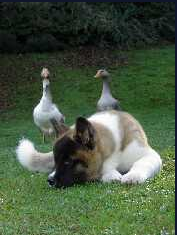- Akita History
- Hachi Ko
- Behaviour and Quality of the Breed
- Training
- Nutrition
- Accoppiamenti
- The Choice of a Puppy
- Wheaning and Growing of a Puppy
- Esposizioni e Toelettatura
- Malattie
- LongCoat Akita
- Bibliography
- Italian Standard
- UK Standard
- American Standard
 The big day has come, after months of waiting the Akita puppy finally enters your life! Start training…
The big day has come, after months of waiting the Akita puppy finally enters your life! Start training…
The first day you should try and avoid any stress for the dog because the fact of being taken away from his mother and brothers may cause him concern and sadness. So do not worry if for the first hours the puppy will be sad or in tears, that is quite normal. For families with small children (3-12 years) be aware that Akitas have a formidable memory. You should prepare your children to welcome the puppy without creating trauma to the newcomer: screams, making him run away, chasing him etc. would scare him. A mistake at this important time may create in your adult Akita anxiety and fears when encountering children.
His biological clock must be respected, so… if he wants to rest, let him do so and donít disturb him stroking him like a teddy bear. Just leave him alone! Organise a proper place for him to sleep. If in the house, prepare a basket with a blanket or one of the many mattresses that you can find in your trusted pet shop. This sleeping place must be in a corner or a quite area of your house where the puppy can rest undisturbed.
If outside, his shelter should be protected from bad weather and elevated from the ground.
Now… moths come into action! In the United States Akita puppies have been nicknamed ì100 pounds mothsî. Be patient and give them many toys to chew in order to alleviate their desire to gnaw.
Be careful with their bones and joints. In their early days they will want to jump from sofas and chairs… make sure that their playing doesnít create too much stress for their legs and feet.
Teach them immediately where to pee. Donít be surprised if they learn really fast… Akitas are a very clean breed.
After the first days with his new family your puppy needs to be put in contact with the outside world and above all he needs to socialize with other persons, children, animals. Obviously each puppy has his own character and all these stimuli should be well balanced in order to avoid fears for the dog.
Very important… Your young Akita should not do long walks or heavy training. All this should start only after 6 months of his life.
Very important… Your puppy should eat the right quantity of food, not too much and not too little (see also chapter “nutrition”).
As for the balanced growth of your puppy, remember that as time goes by your Akita (of dominant character) will seek to climb up the hierarchy. You will need to cope with his instinct to be the boss. In dealing with the dog be aware that Akitas react more to a firm verbal command than to physical force.
Do not beat your dog or he will not develop trust in you.

